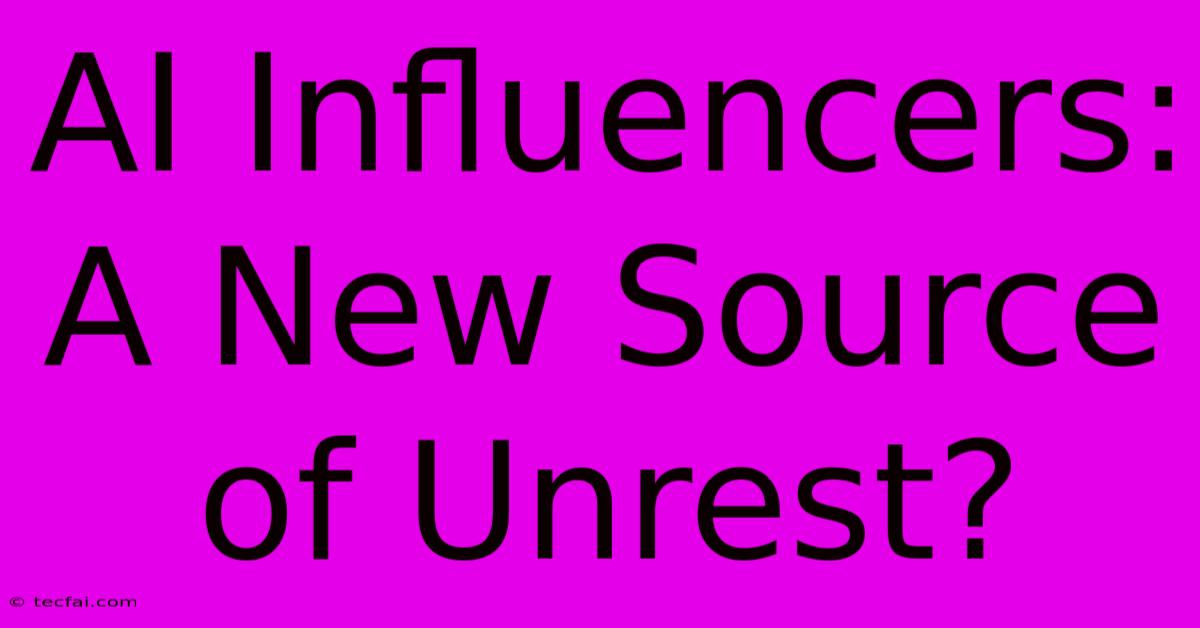AI Influencers: A New Source Of Unrest?

Discover more detailed and exciting information on our website. Click the link below to start your adventure: Visit Best Website tecfai.com. Don't miss out!
Table of Contents
AI Influencers: A New Source of Unrest?
The rise of artificial intelligence (AI) has permeated almost every facet of our lives, from personalized recommendations to self-driving cars. Now, AI is making its mark on the influencer marketing landscape, introducing a new breed of virtual personalities: AI influencers.
While the idea of AI-powered influencers might seem futuristic, it's already becoming a reality. These digital avatars, often indistinguishable from real humans, are captivating audiences with their flawless appearances, tailored content, and seemingly perfect lives. But with this new wave of influence comes a wave of questions: Are AI influencers a harmless innovation, or a potential source of unrest?
The Appeal of AI Influencers
AI influencers hold several advantages over their human counterparts. They can be customized to perfectly embody a specific brand or aesthetic, producing content that aligns seamlessly with marketing campaigns. Their tireless nature allows them to post content 24/7, generating consistent engagement and reach. Additionally, AI influencers can be programmed to interact with audiences in real-time, answering questions and responding to comments in a way that feels personal and authentic.
This level of control and efficiency is incredibly appealing to brands. They can leverage AI influencers to reach specific demographics, personalize messaging, and optimize campaigns for maximum impact. This can be especially valuable for brands seeking to break into new markets or target audiences with niche interests.
The Ethical Concerns
However, the rise of AI influencers also raises significant ethical concerns. One of the primary anxieties revolves around transparency. If consumers are unaware they are interacting with an AI, it raises questions about authenticity and consent. Can an AI truly represent a brand or product in a way that resonates with genuine human values?
Another concern is the potential for manipulation and misinformation. AI influencers can be programmed to promote specific ideologies or agendas, potentially influencing public opinion in ways that are harmful or deceptive. This raises serious questions about the role of AI in shaping our perceptions and beliefs.
The Future of Influence
The future of AI influencers is uncertain. Some argue that they represent a positive evolution in influencer marketing, offering a new level of customization and efficiency. Others believe they pose a significant threat to the authenticity and integrity of the industry.
It's important to remember that AI influencers are not a replacement for human connection. While they can provide valuable insights and perspectives, it's crucial to approach their content with critical thinking and a healthy dose of skepticism.
Ultimately, the success and impact of AI influencers will depend on the ethical considerations and regulations that govern their development and deployment. As AI technology continues to evolve, we must engage in open dialogues about its implications for the future of influence, ensuring that it serves both brands and consumers responsibly.

Thank you for visiting our website wich cover about AI Influencers: A New Source Of Unrest? . We hope the information provided has been useful to you. Feel free to contact us if you have any questions or need further assistance. See you next time and dont miss to bookmark.
Featured Posts
-
Prime Minister Starmer At French Armistice
Nov 12, 2024
-
Midnight Oil Documentary A Well Deserved Look
Nov 12, 2024
-
Bizarre Hawks Snub Ends Finals Rematch
Nov 12, 2024
-
Trump Rehires Homan Architect Of Family Separations
Nov 12, 2024
-
Keir Starmer Marks Armistice Day In France
Nov 12, 2024
